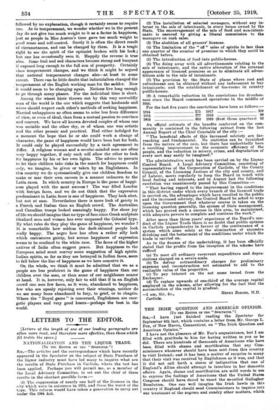LETTERS TO THE EDITOR.
[Letters of the length of one of our leading paragraphs are often more read, and therefore more effective, than those which fill treble the space.] NATIONALIZATION AND THE LIQUOR TRADE [TO THE EDITOR Or THE " SPECTATOR."3
Sia„—The articles and the correspondence which have recently appeared in the Spectator on the subject of State Purchase of the liquor industry must have led many to inquire what are the results of State Purchase in Carlisle, where the test has been applied. Perhaps you will permit me, as a member of the Local Advisory Committee, to set out the chief of these results in the shortest possible form :
(1) The suppression of nearly one half of the licences in the city which were in existence in 1915, and these the worst of the type. This reform would have taken a generation to carry out under the 1984 Act.
(2) The, installation of salaried managers, without any interest in the sale of intoxicants, in every house owned by the State. The encouragement of the sale of food and non-intoxicants is ensured by giving . a liberal commission to the managers on such sales.
(3) The abolition of all grocers' licences.
(4) The limitation of the " off " sales of spirits to less than one quarter of the number of premises in which they could be obtained before.
(5) The introduction of food into public-houses.
(6) The doing away with all advertisements relating to the sale of intoxicants, and the entire alteration of the external appearance of licensed premises so as to eliminate all adventitious aids to the sale of intoxicants.
(7) The provision by the State of places where rest and refreshment can be obtained without any inducement to buy intoxicants; and the establishment of tea-rooms in country public-houses.
(8) A remarkable reduction in the convictions for drunkenness since the Board commenced operations in the middle of An official estimate of the benefits conferred on the community is contained in the following extract from the last Annual Report of the Chief Constable of the city :
" The beneficial effects of this increased sobriety are farreaching and fundamental. No statistics can be furnished from the nature of the case, but there has undoubtedly been a resulting improvement in the economic efficiency of the people, and the reduction in misery, crime, and degradation of every sort logy easily be imagined."
The administrative work has been carried on by the Liquor Control Board. A Local Advisory Committee, consisting of representatives of the Corporation of Carlisle, of the County Council, of the Licensing Justices of the city and county, and of Labour, meets regularly to keep the Board in touch with local feeling and interests, and in August last the following resolution was unanimously passed by this Committee:—
" That having regard to the improvement in the conditions in this district under which every branch of the licensed trade is carried on, the advantages which have resulted to the public and the increased sobriety, the Control Board be asked to urge upon the Government that whatever course is taken on the licensing question generally, the system of State management, which has proved such a success in this area, be maintained, with adequate powers to complete and continue the work."
After more than three years' experience of the Board's conduct of the Liquor Trade there is no doubt that public opinion in Carlisle preponderates in favour of the continuance of a system which aims solely at the elimination of excessive drinking and the betterment of the conditions under which the trade is carried on.
As to the finance of the undertaking, it has been officially stated that the profits from the inception of the scheme have sufficed (a) To meet all ordinary recurrent expenditure and depreciations charged on a severe scale. (b) To defray extraordinary charges for preliminary expenses and reconstruction not estimated to add to the realizable value of the properties. (c) To pay interest on the net sums issued from the Exchequer. (d) To replace upwards of one-third of the average capital employed in the scheme, after allowing for the fact that the accumulation of the capital is gradual.
—I am, Sir, lie., HENRY BARNES, M.D.
Carlisle.










































 Previous page
Previous page